Yves here. Tom Neuburger’s discussion of the growing political influence of TikTok, particularly among the young, helps explain why the officialdom is eager to considerably constrain it, as well as control speech on other platforms, as the Twitter Files and existence of other soi-disant disinformation initiatives show.
While Neuberger is correct that these platforms can create large groups who have common views and purpose (witness Black lives Matter, which got its momentum on Twitter before Democratic party forces co-opted it), it’s hard to see how the US gets from that to French-level revolt. There are so many forces operating against it.
First is that France is proud of its 1789 revolution and I strongly suspect also covers the failed 1848 rebellion (among other things, the backdrop of Flaubert’s L’education sentimentale) and its 1871 Paris Commune. Other countries have not hesitated to substantially recast their histories in the interest of social engineering. French readers are encouraged to pipe up, but at least when I was young, this did not seem to be the case.
Second, by contrast, America has long been focused on commerce and individual prosperity (see de Tocqueville’s Democracy in America). Post our Revolutionary War, rebels have been member of out groups (laborers, immigrants, women, blacks). Our histories seldom celebrate them, particularly if their campaigns get rough.
Third, neoliberalism has weakened community ties, which also weakens organizing muscle. Neoliberalism has also gutted social safety nets. That in combination with employers seeking workers with narrow skills and experience means that even in an apparently tight labor market, prospective employees with an arrest record for protesting will be at the back of the hiring queue. While this post includes talk of GenZ having nothing to lose….I don’t mean to sound cynical, but really? My time in the Deep South has given me a window on real poverty, as in people facing the real prospect of living in their car, which may still be only a waystop to living in the streets. And yes, it gets below freezing here in the winter. By contrast, participants in the old French uprisings often recognized they really were risking serious injury and death. And the bloody history of labor organizing in the US has been written out of most histories. Goons like the Pinkertons and the Henry Ford private army would lynch labor leaders, with the police turning a blind eye.
Finally, the US, unlike most European countries, does not have a single city that is the seat of government and the center of commerce. Being able to seriously disrupt such an important hub can give protestors leverage that is harder to achieve in a country with multiple loci of activity.
Shorter: forming large-scale communities seeking change is a necessary but not sufficient condition for effective protests. I’m skeptical the other conditions exist or can be ginned up, at least in the US.
Unfortunately, and it would be much better if I were proven wrong, yours truly has long thought that response to greater income disparity and deteriorating conditions at the bottom would be more individual rather than organized and politicized violence.
And even if the US does see large-scale, organized protests, our police has been militarizing for a while and has been upgrading its implements, witness the robot dogs.
By Thomas Neuburger. Originally published at God’s Spies
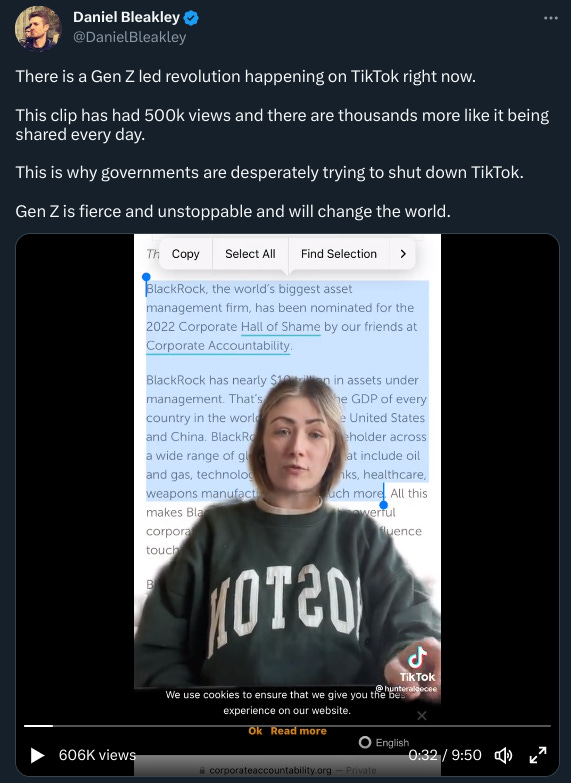
I don’t agree with the tweeter’s reason why TikTok is under threat (third sentence), but the rest of his statements are true, especially the last: “Gen Z is fierce and unstoppable.” I don’t think they’ll go down polite. Full video below.
I want to start writing some pieces around repair, focused on fixing what’s clearly breaking down. I’ll do this in chunks, however. Starting with this, the idea of “critical mass.”
The Virtues of Critical Mass
First, a taste of what’s needed to fix our world, or at least the American part of it. One of the absolute necessities will be critical mass, a Sixties-style revolt against “things as they are” that’s also large enough to be self-regenerating.
Think of a gas-fired motor. Before electrical starters were added to cars, the motors had to be cranked by hand to get them started, turned by hand until they “caught” and rotated automatically, each turn powering the next.
Some lawn mower motors are like that as well, or used to be. Same with public revolt expressed in demonstrations.
Millions of people turned out in 650 cities to protest the Iraq War on February 15, 2003. It did no good. Not enough people, not enough disruption, no persistence at all. Result: No critical mass.
In contrast, Bernie Sanders and his crowds, in city after city, month after month, reached critical mass in both 2016 and 2020. That size and persistence almost powered him to the nomination twice.
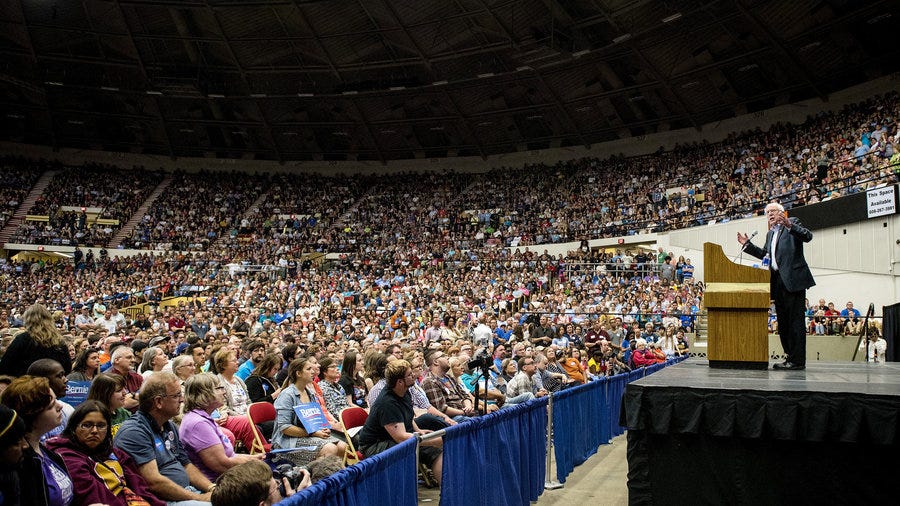
Bernie Sanders speaks in Wisconsin in 2019
It took the combined effort of many elites to keep him from being elected.
Or consider the list of protests against the Vietnam War, hundreds in number. Those disappeared by the time Nixon was on the ropes, not for the War, but for crimes against other elites (like breaking into Democratic headquarters). But the protests did their job, first driving Johnson to retire, then keeping pressure on Nixon till he fell.
Another side of “critical mass” is disruption. Witness what the French — the derided “surrender monkeys” of Bush-era fame — are doing today [photo not included due to copyright protection]:
This is how people who really don’t want to be messed with show their displeasure. If they keep that disruption going and at that scale, the government will cave. If it doesn’t, it won’t be a government that’s still a republic.
So ingredient number one for successful revolt — critical mass.
Critical Mass Today
Where will critical mass come from today? A lot of places, but social media is one. Enter TikTok, to a great many people’s surprise.
Consider first the video below. If you have time, listen all the way through.
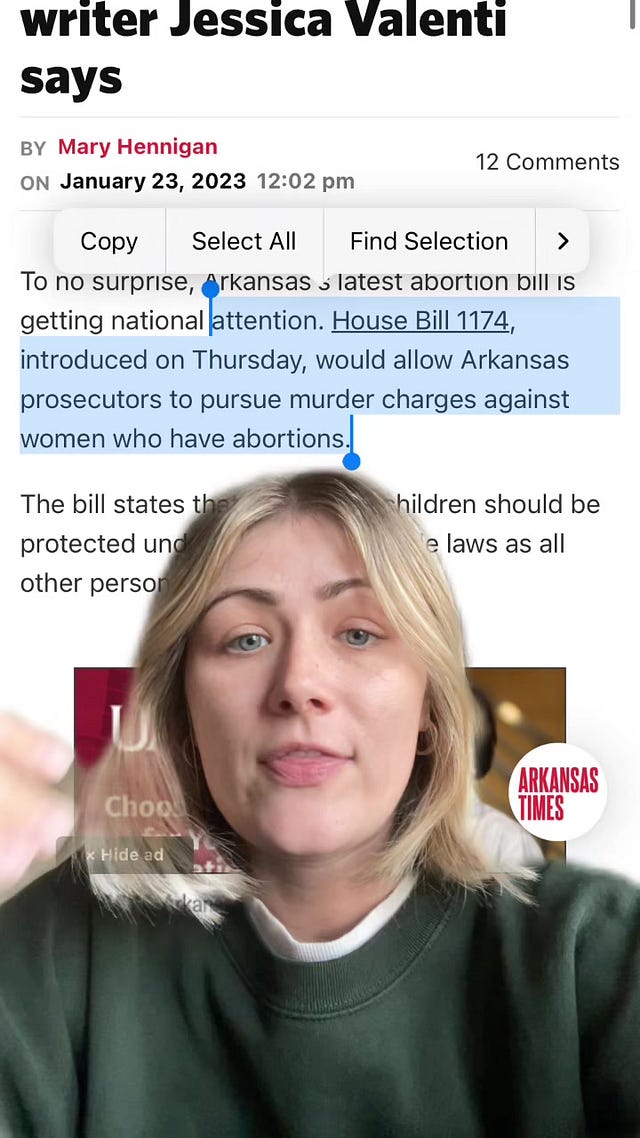
This video has 2.8 million views as of this writing. And it isn’t a political channel. She mostly “toks” (is that what they do over there?) about her personal life, like discovering that for her, “bi” could mean “gay.” It’s a fun channel, a real Gen Z mashup. But note that her few political “toks” — I’m just making words up here — get 10 times the viewage of most of her others.
Here are a few more from TikTok, courtesy of this Twitter thread. This one has three million views, and it is from a political feed:
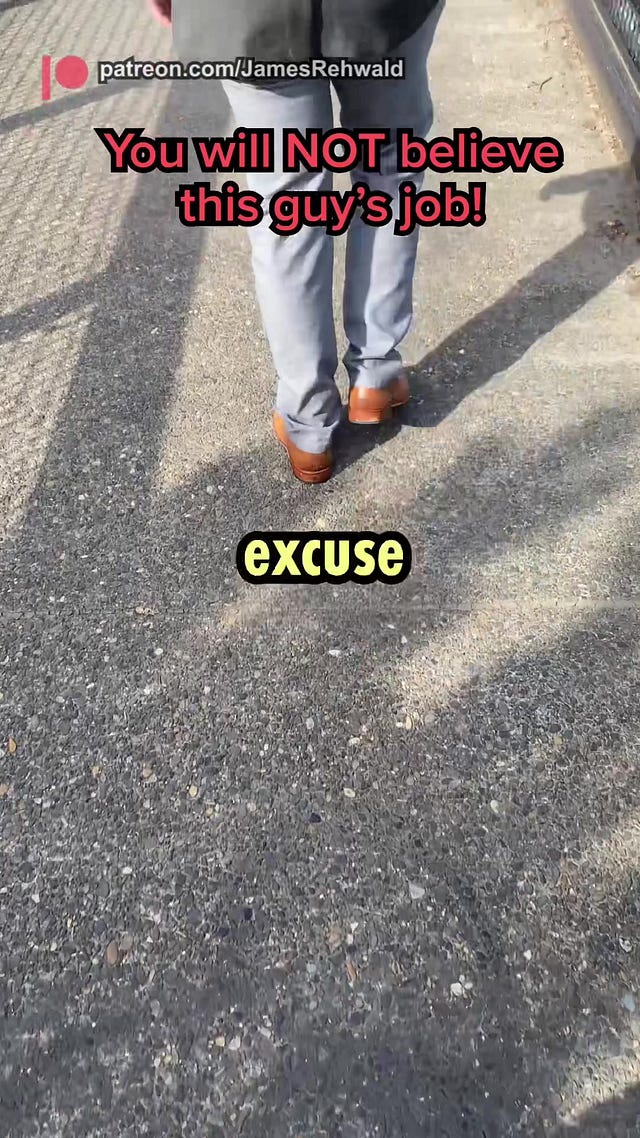
So does this one:
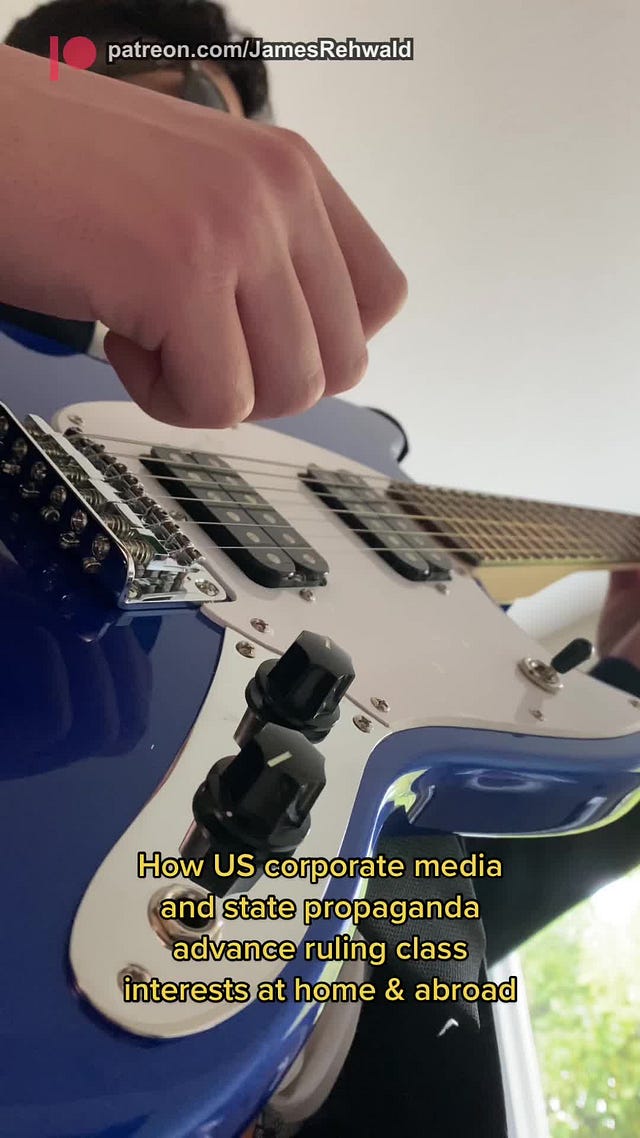
‘Nuff said?
Critical mass is just one of the pieces needed to spark the Next American Revolt. It’s not here yet, but it’s coming.
Acting French
The people with nothing to gain from solving our problems and all their possessions to lose — the octo and nonagenarians in charge of it all (you know who I mean) — have yet to face the full anger of people with nothing to lose if they fight back hard.
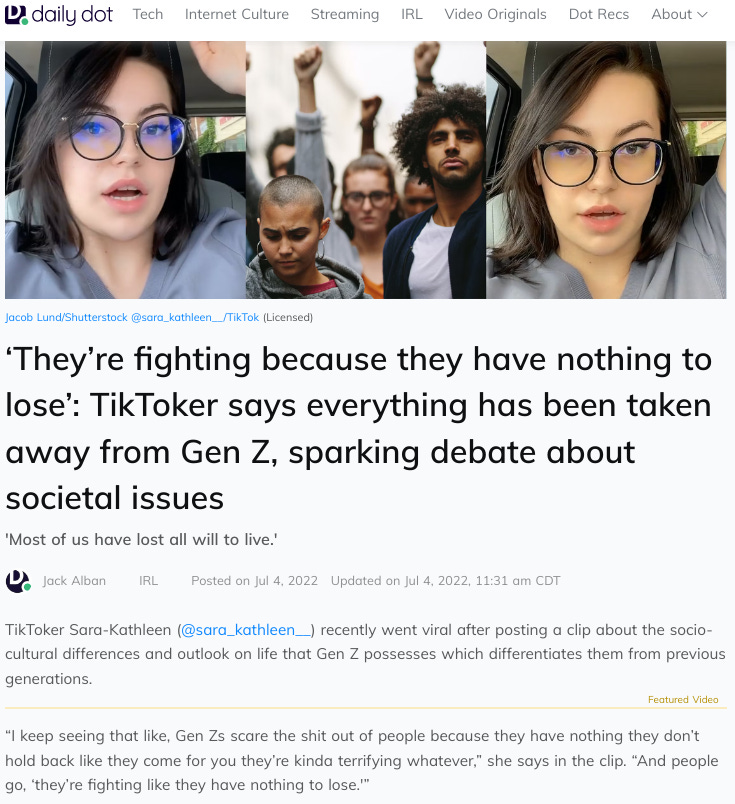
The ground’s being laid.
If I were an octo in charge, I’d be concerned. What if they start to act French, these Gen Z types, while you’re still on the earth?


My daughter, late 20’s, has been trying to get me to install TicTok on my phone. It’s basically where she gets most of her social/news information. Facebook, ha!, neither she or friends spend anytime there, nor do I for that matter. I guess grandparents still use it.
I installed Twitter a couple of months ago and now spend more time on it than Ytube, which for news searches is useless (I still go there for listening to music and music lessons). The TikTok videos I have seen, are definitely outside the overton window of what you’ll find on Regime Media (RM).
I think it may be time for me to check it out, before it’s gone.
As for mass movements/protest. French are still in the streets and as far as I can tell the gov’t is not rescinding the pension reform legislation. And, as the article points out, the protest over Iraq war didn’t do much. When people coalesce around a figure like Bernie Sanders, or other figures like AOC, those leaders are coopted or controlled, selling out their supporters and accomplishing nothing.
I would be interested in Yves expanding on her statement that a “response to greater income disparity and deteriorating conditions at the bottom would be more individual rather than organized and politicized violence.” What would that look like? Boycotts?
No, what we are seeing now. More shootings. I’m also told of other breakdowns in authority. I’m traveling and chatted with an 85 year old resident of the Bronx. She said the city is a mess, shopping thinned out due to Covid, but too many safety issues on public transportation for her to use it for decades, and getting even worse recently. As an aside, I have a friend who had lived in Manhattan, then Forest Hills (Queens) and a couple of years ago to the Midwest where she has family. She’s older, average height but very petite framed. When she was in Queens, she increasingly came to regard the subways as unsafe. Too many panhandlers who carried themselves in a threatening manner. BTW I never saw this on the subway in Manhattan. She agreed and said the outer borough system was not well policed.
In any event, my Bronx interlocutor cited as a further sign of breakdown that people were getting on the city busses and not paying the fares and the drivers were afraid to insist. Of course they could stop the bus but it seems awfully likely that they’d get hell from the higher ups for choosing to get behind schedule.
MTA bus drivers are explicitly instructed during their training to not pursue collecting fares from or engaging with fare evaders. That has been policy since at least the late 1990’s. That said, fare evasion on the subways is off the charts compared to years past. Then again, it’s almost incomprehensible to me how working and poor people can make it NYC, so dare evasion is probably a budgetary matter for some.
There is a “thinning out” and general diminution of spirit and resources in the city, perhaps not so noticeable day to day, but cumulatively quite striking.
just today in the news: Germany has 7000 people in prison for not paying tickets for public transport.
It sounds incredible to me. But there are in fact human beings who enforce this law.
There are initatives to free them.
But the law must be changed.
Similiar with food being thrown away by supermarkets.
I don´t know the update but until recently it was illegal to take that food for yourself or give it to the homeless.
Again individuals create and enforce these laws.
Who. Are. These. People?
Here is a link to the 7,000 in prison for not paying travel fares in Germany.
“Prison states, prison states, everwhere”
Samuel Taylor Coleridge, The Rime of the Neoliberal State
https://www.sueddeutsche.de/politik/ersatzfreiheitsstrafe-schwarzfahren-gefaengnis-semsrott-1.5818821?reduced=true
Weekend before last I attended a memorial service for a friend. At lunch with some of my oldest friends I asked the two with 40 years experience each in law enforcement if things had gotten worse lately. Much more than worse was the reply, with all ages of miscreants. Most act out with impunity. One agency will pursue criminals while the other will not (officers are suspended for doing so). Naturally the criminals take advantage by doing their smash-and-grabs and drug deals under the “correct” jurisdiction. This, in a county of 80,000, mostly urban and suburban with a large tourist/second house component. Several Saturdays ago one of my friends dealt with four fentanyl overdoses. He saved three with Narcan but one 21-year-old was found dead in her car, a block from a busy intersection. Daughter of a community business leader. Life has changed…
Yes France, a real bastion of freedom.
https://jonathanturley.org/2023/04/24/macron-gives-le-doigt-to-free-speech-anti-macon-protesters-to-be-prosecuted-for-flipping-off-french-president/
When I was in France years ago I was struck by the fact that they had first and second class subway cars. This could never happen in America I said to myself. But it seems these pentimenti of aristocracy exist all over Europe including the EU itself. Maybe all that “social democracy” was just a temporary pose. Meanwhile our American aristocracy watch shows like Downton Abbey and say “cool!” Those underlings really know how to keep to their station.
And BTW Gen Z seems to only be “fierce” in defense of fellow TikTokers. They have as much contempt for the masses as the aristocrats do. Just as in France the fear of “the right” is what keeps people like Macron and Biden in power.
More Turley. Here’s your “fierce” Gen Z in action. They care about freedom alright, but only for themselves.
https://jonathanturley.org/2023/04/27/antifa-attacks-protect-the-kids-protest-against-drag-show/
Meanwhile back at headquarters they nod approvingly. Divide and conquer is working very well.
Another sign of a country gone crazy, the sleepy, NE Ohio exurban town where our kids live has had a Nazi group, complete with swastika flags, march against a local downtown business (boutiquee place) with a drag show. They came in buses. (the Nazis, not the drag performers)
So the drag show got the reaction that they wanted. A plague on both sides.
We go bankrupt “quickly, then suddenly” it seems and as we continue down the path we are on the instability grows, which will push us to the point where the cost of true protest and activism will be less than remaining complacent and complaining, even if loudly, on social media.
I wonder that age will matter. The number of those who have been disenfranchised is much larger than those who benefit from the status quo, for each generation.
Charles Hughes Smith captured a piece of it Wednesday:
What If the Whole Shebang Unravels?
The idea that Tik Tok will help us reach this mythical “critical mass” is ridiculous. The protests against the invasion of Iraq and the Bernie campaigns were able to mobilize large amounts of people, but it was the lack of durable organizations that prevented the numbers from being able to affect deeper change. How exactly will Tik Tok views translate to IRL action and participation? if anything, it’s a safe containment of popular agitation by restricting how Gen Z’ers engage in political issues to online platforms where they remain disconnected from on-the-ground struggle. If I was the ruling elite, I’d be perfectly content with zoomers blowing off steam making tik toks rather than joining popular organizations and organizing to address the material base of society. Relying on media to mobilize people has it backwards, and it is idealism, and therefore a lost cause.
Where else are you going to even make first contact with people and expose them to the way of looking at the world that is prerequisite to action? Not that many are found on the shop floor these days. You’re surely right that all organizing, even face-to-face organizing, has been very ineffective for a long time, but maybe that was as much because of the strength of the opponent as the inability to organize on a more permanent basis. Now the Empire is showing its feet of clay. Finally under real pressure again from the outside for the first time in more than 25 years, internal dissent may soon have more leverage than in a long time.
What France has is a way to blow off steam in a pressure cooker, whereas efforts here have been stymied or left to individuals-almost almost with the steam coming out of the end of a barrel.
Mass murders are so common these days, the politicians promulgating guns don’t even have a chance to offer thoughts & prayers before the next gory news cycle takes over.
I have nothing in common with a 25 year old except their growing love of the wilderness, and that’s how I try and connect with them, and our encounters are interesting in that its one of the rare times that they are unconnected from the wired world.
Nothing in common? I would guess that wanted to have a functioning society that existed even a few decades would be something. People keep talking about how different each generation is supposed to be from each other. I do not see it. What I do see is each generation arising in increasingly dysfunctional times and societies, which means our knowledge of what was and therefore what could be again is different; also, part of the craziness that is coming from the older leadership is that they are still believing that yesterday is today as being in a high position isolates people from the changes in our society. If you are among the disposables, your age does not protect you from the changes in the world.
People want a decent life for themselves, their families, and their friends, and maybe even for their enemies. It does not change that from each generation; I do not think that anyone can assume that they are truly different from anyone else especially the 90% that are not in the privilege classes.
I just saw some old color videos in Reddit showing Los Angeles and San Francisco in the 1940s and 1950s; aside from the cars and the clothes, what was just amazing was seeing streets, sidewalks, and buildings that I recognize having driven and walked on them many times being bizarrely full of people thin people walking or driving peacefully and without a hurry. Everyone fully dressed. Absolutely no homeless. No tourists. No empty spaces that once had businesses. No decay. Fully functional, normal cities with people from working to upper middle class just walking. And the variety of stores…
How different a place then, I could drive to within a hour now has homeless people, a methadone clinic, and emptiness. Of course, I can’t go there at this hour without risking being mugged, and it’s been this way for years. It could make a man cry.
I really do think that we all have much more in common than we understand. The details are often very different, but the goals are much alike. Mostly, it is only the crazy fringes, often deliberately made that way, who might disagree.
Never thought about it in these terms but I think that I can see why Tik Tok is seen as a ‘national security threat.’ We have read how the government controlled the old Twitter to an enormous extent and the same must be true of Google, Facebook, etc. If you had mass protests larger than the BLM protests about living conditions in America, all those social media organizations would clamp down but fast and stop any info on rallies, messages, etc. going out. But if Tik Tok is not based in California, they may not be able to do the same. If so, this may indicate a paranoid government who is not sure of their control any more.
As an aside, 2 weeks ago a friend visiting her hometown in north China messaged me saying she was bored out of her head and her kids were complaining because TikTok was blocked on her phone (along with all the western apps). So it seems that even the Chinese are wary of its potential.
That said, I’m not particularly optimistic that it has a future for organizing. Or to be specific, it could only be used for organizing if TikTok HQ wanted it that way – its no secret that they have a very strong control over what content the algorithms push to your phone (much more so than, say, Twitter). I also don’t think that such short clips act as anything other than a way for people to let off steam – you need deeper interlinked content for organizing and changing peoples minds.
Hm, TikTok is not banned in China, rather Bytedance has a separate app for the Chinese market called Douyin. Every Mainland Chinese should really know this. It’s really the same app using different servers to comply with Chinese Internet laws.
She didn’t say it was banned, she said access to it was blocked in her city. Localised blocks are quite common so far as I can see.
Tik Tok is Bytedance which is majority owned by a former Goldman banker and Kohlberg Kravis Roberts, among others. Follow the money and name names.
The danger to the govt. from TikTok is its ability to provide alternative world views and news, people have to first understand that there is a problem before they can start to organise to solve the problem. My 18yo daughter understands far more about world politics and the role of the USA in the disaster that is currently unfolding than I did even when I was much older. TikTok is really very useful in this regard.
I seriously doubt that TPTB are quaking in their boots over a Gen Z revolt against the status quo. Generational labeling is, or should be, the most obvious divide-and-rule tactic that elites have come up with. Premising a revolt on generational labels seems like a case of thinking how “they” want you to think.
To be clear:
I said most obvious divisive tactic, not most harmful.
There’s no implicit criticism of any generation, I personally think generational labels are arbitrary and mostly describe age differences anyway.
I could be wrong, or I could be right and “they” could be miscalculating.
I’ve heard this argument 20 years ago. Back then it was “the internet” that was going to solve all the problems. It was going to promote democracy around the world, lead to a more informed society, break down social barriers. I even took a whole university class on the subject in 2002 and the professor would accept no argument to the contrary. I wish I could find that guy now and see what he thinks.
If these TikTokers can get it to work, I’m all for it. But, I’m not going to hold my breath.
As an early millennial, the same thing was said about us, twenty years ago about our discontent with the Dubya regime…protests were launched, Howard Dean was rising in popularity…
Yet here we are now, with neoliberalism chugging along, millennials heading towards middle age (Wait until we millennials start experiencing age discrimination en mass as a generation as if we have not had enough bad luck already) and the same choice between two neoliberal, pro-war political parties, with one being slightly more left-leaning on social issues whenever it suits their agenda.
There are probably several reasons why mass protests are both rare as well as ineffectual in the US, and I am only theorizing here…
1. The US is very big with a very unevenly distributed population as well as being composed of patchworks of very different cultures, making the organization and social unity required for mass movements very difficult to achieve, and when it does happen, it generally only lasts for a few days before a combination of in-group infighting and retaliation by local law enforcement causes it to die down again.
2. US Politicians do not care about how big protests are, as they feel they are under no obligation to respond to public opinion, as they basically see themselves as akin to nobles in a political hierarchy, much like the patrician class of ancient Rome. The plebes can scream and protest as much as they like, but our leadership feels neither threatened nor cares about public outcry as they have surrounded themselves by a powerful and thick institutional bubble, and if malcontents get to be too much of a nuisance, our militarized law enforcement precincts are all too happy to put the underclass back in its place.
3. The elites also have more tools and technology than they did during the first Gilded Age to head off any sort of mass movement. Thanks to the degree of surveillance and spying technology as well as the partnership between Silicone Valley technology companies and all of the government alphabet agencies that exists now, both government and private companies are constantly looking for and are aware of any degree of pro-labor/anti-authoritarian movement long before it ever gets off the ground and can nip it in the bud before it even starts.
4. Much of the US citizenry also seems to have subconsciously bought into a form of Stockholm syndrome with how it looks at our policies at the national level. As a lot of people still erroneously think that the US has the highest standard of living and best quality of life in the world, they have no motivation to advocate for reform or change as they think that things for them are already as good as they can possibly be. It does no good to point anything out to the contrary to them as they will reflexively disregard any evidence to the contrary out of years of practice born out of denial.
5. Related to the above, there are also fewer and fewer people left to remember what the US was like before neoliberalism, so they cannot possibly imagine a time when things were not as they are now. Millennials and zoomers were surrounded by neoliberalism since before they were even born. Many Millennials have long ago succumbed to the cynicism resulting from the W. Bush years, Obama’s betrayal, and the failure of the Sanders campaigns that they think that it is pointless to hope that things can change for the better. Zoomers might still protest here and there, but eventually they might give up and accept things as they get older as well. As soon as the boomers start dying off in their old age, the pre-neoliberal era might start to be regarded as a sort of cultural mythology by geriatric millennials and aging zoomers…a sort of distant past that would be impossible to achieve now.
Anyway, this is just speculation on my part. I could be pleasantly surprised in terms of what direction things take, but I do not see things changing for the forseeable future as things are going just great for the aristocracy that is running things in the US, and they have numerous and powerful safeguards in place to ensure that things remain as they are.
I’m not getting my hopes up until I see critical unions start to strategize collectively. I’m talking mostly about transportation workers: truckers, railroad workers, pilots, flight attendants, and air traffic controllers; also longshoremen, teachers, and nurses for an added boost. Just imagine what a one-day walkout would do, then threaten another, and another.
Do you think Washington and Wall Street would get the message? Certainly more effective than the Iraq War or BLM protests, or the more performative rallies like the Women’s March.
Ronald Reagan broke the unions once. Another American president can do the same. Granted I don’t know all the details, but seems to me after a cursory reading of America’s history that there was no sustained mass movement even during the Great Depression. Yes, there were frequent riots in many places but no national movement. And we all know what came after the Great Depression. My fear is that some politician will someday rise to national prominence by suggesting that Making America Great Again really means World War III.
as to France and strikes.
I don´t know for this very presence.
But in the past frequent French strikes were among others for lack of labour rights institutionalized unlike in Germany (in Germany: union representatives in the directorates of heavy industry and management.)
So Germans did not go on strike as often, because their laws were more progressive.
There were and still are regulations to negotiate between work force and management.
Regulations that did not exist in France.
At least that´s what I remember from my sociology studies at University.
I know of course labour unions have been weakend. But until late 1990s Germany did have its “Flächentarifvertrag” which guaranteed equal working conditions for all employees of a certain sector or employer if once negotiated for the entire country.
With Gerhard Schröder this changed. Unions were broken up, atomized, many small unions, each with much less power replaced the few big ones.
I would suggest the USPS as a way to get around censorship, but they have been keeping track of all United States mail for decades.